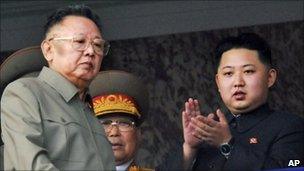Tears and goose-steps for North Korea's heir apparent
- Published

Most North Koreans have only recently heard of their presumed next leader, Kim Jong-un (R)
North Korea is showing off both its past and its future to the outside world.
It extended an extremely rare invitation to the world's media to come to Pyongyang to see a major military parade.
Officials here used the event to attack the "imperialist" United States, as they have done on many previous occasions.
But North Korea also gave the world a glimpse of something new: it unveiled the man many believe will be this country's next leader.
Kim Jong-un is tipped to succeed Kim Jong-il, his father - and North Korea's current leader - who is believed to be in poor health.
Getting accurate information out of one of the world's most secretive states is not easy.
Journalists, analysts and foreign governments often have to read between the lines or work out the meaning of symbolic events.
Last month Kim Jong-un was made a four-star general and given senior positions in the government and the Korean Workers' Party. Many thought then that the younger Mr Kim would eventually succeed his father.
This weekend foreign journalists had a chance to confirm that suspicion when they were unexpectedly allowed to visit North Korea.
Just hours after landing in Pyongyang's shabby airport - there is little air traffic - we were whisked to a special performance of the Arirang Games.
Annual performances take place over a series of weeks involving tens of thousands of singers, acrobats and gymnasts in an open-air stadium.
For Saturday night's show the venue was ringed with soldiers carrying machine guns. There were security checks for the audience.
Inside there seemed to be a selection of North Korea's most important people: army officers in full uniform and civilians in sharp suits.
During one part of the show the lights suddenly shone on the seats reserved for the most important guests.
There was Kim Jong-il, known as the "Dear Leader", and with him was his third son, Kim Jong-un. The audience turned their heads to look and then cheered.
The Young General
The two men appeared together again on Sunday at the military parade, which took place in Pyongyang's Kim Il-sung Square - named after the current leader's father, the founder of North Korea.
The parade was organised to celebrate the 65th anniversary of the founding of the Workers' Party.
North Korea used the event to show off some of its military hardware. There were rocket launchers, missiles and tanks spewing smoke.
Chris Hogg: "Kim Jong-il knows that he needs to get the military on side if he is to secure the succession" for Kim Jong-un
There were also thousands of goose-stepping soldiers, marching in perfect unison. The ground shook as they filed past the main podium, where Kim Jong-il and his son were watching.
As the parade ended, many of those who had taken part surged forward towards the podium and began chanting Kim Jong-il's name.
Many were crying, although in a country where complete acceptance of the current leadership is essential, it is not clear whether they were genuinely moved.
Kim Jong-il responded to the call and came forward, clapping his hands and waving. He looked frail as he walked along the viewing platform with a noticeable limp.
He is reported to have had a stroke in 2008. If he is ill, it could explain why he is so keen to rapidly promote his third son, who is only in his late twenties.
Until recently Kim Jong-un was hardly known even inside North Korea, but people here are already referring to him as the "Young General".
It might not be long before the Kims extend their family's iron rule over North Korea for another generation.